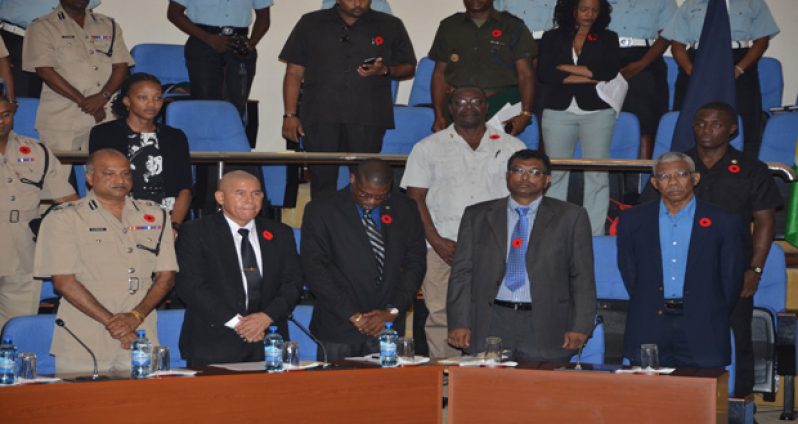PRESIDENT David Granger has proposed a three-point approach of Enforcement, Education and Engineering to reduce road deaths in Guyana – an epidemic which has caused the deaths of more than 2,000 Guyanese since the start of the millennium.Through such a programme, President Granger said, road accidents and by extension road fatalities can be reduced significantly in Guyana in keeping with national, regional and international commitments made.
Worst ranking
But all hope has not been lost although Guyana has the worst ranking for road fatalities in the English-speaking Caribbean, President Granger said, while delivering the feature address at the launch of Road Safety Month 2015 at the Arthur Chung Convention Centre on Wednesday.
The event was held under the theme “Be wise, stay alive, stop speeding, don’t drink and drive”.
“Guyana has the worst ranking for road fatalities in the English-speaking Caribbean, and the average is about 27.8 for every 100, 000. In fact, in the entire Western Hemisphere, Guyana ranks 5th in terms of human fatalities,” the President pointed out, explaining that between 2000 and 2014, 2,160 road fatalities were recorded of which 262 were children. He noted, however, that a greater effort has to be made as he put forward his three-point proposal.
Meanwhile, Goal Three of the New Sustainable Development Agenda, which was recently adopted by the UN, calls for the 193 member countries to ensure healthy lives and the promotion of well-being for all at all ages.
This new agenda has been launched at a time when Guyana continues to struggle to fulfill the objectives outlined in the United Nations Global Decade of Action for Road Safety 2011-2020. In the words of the President, “this launch seemed to have had very little impact on Guyana as the epidemic continues.”

STRONGER ENFORCEMENT
He said the country must first strengthen its enforcement, stating clearly that “traffic laws must be vigorously enforced.”
“The Guyana Police Force has indicated repeatedly that speeding is one of the principal causes of fatal road accidents in this country. There is need for the police to ensure that speeding is reduced by having more visible presence on our roadways,” he added.
According to President Granger, there is need for more CCTV security cameras to monitor the flow of traffic not only in Georgetown but in other “built-up areas” across the country, in addition to the need for more speed guns and breathalyzers.
Driving under the influence of alcohol is another risk factor, the President pointed out, noting that such an act not only endangers drivers but other persons utilising the road. As such he proposed that the sale of alcohol be prohibited at minibus and car parks. “We must move towards prohibiting the sale of intoxicating beverages in or near public transportation terminals, that is, at minibus parks…that is going to help.”
The second approach the country must adopt is education, President Granger further stated, emphasising that there is need for greater education to instruct not only drivers but passengers and pedestrians as well on the danger of speeding.
“Drivers, particularly drivers of minibuses, cars and taxis, and I mention these not because I am singling out a particular group of people but because they carry human beings and I am very concerned about the loss of life.”
He added that drivers operating within the public transportation system must be reeducated, retrained and recertified so that they can be qualified to be responsible drivers of vehicles with passengers.
“I believe that persons who are driving human beings in this country, in commercial vehicles, must also have a special qualification, they must be sober, they must be responsible and they must not speed.” President Granger made it clear that drivers within this grouping must not be granted such a license unless they would have proven their suitability.
Engineering was the third approach which was put forward by the President. According to him, Guyana does not have highways, maybe with the exception of the Linden/Soesdyke Highway, but rather it has public roads that run through highly populated areas.
Many of the roads in rural communities, he observed, have encumbrances coupled with the lack of lights and the requisite road demarcation.
“On any given day, you would find that there is great competition for space, motorists use the roads, motorcyclists use the roads, pedestrians use the roads,” he said, adding that engineers should work to enhance the country’s roadways by putting in pavements and pedestrian crossings where necessary.
Meanwhile, Guyana National Road Safety Council (GNRSC) Chairman (ag), Frank Pompey said that in light of the increasing road fatalities, the process of issuing a driver’s licence should be revised.
It was pointed out that in 2012, 102 fatal accidents were recorded claiming the lives of 117 persons while in 2013, 103 accidents resulted in the deaths of 122. The figure was slightly reduced in 2014 with 92 accidents claiming the lives of 111 persons, but so far for 2015, 100 persons have died as a result of 84 accidents.
Legislative reform
According to Pompey, a lawless public transportation system, road users under the influence of alcohol and other substances, engineering road design deficiencies, inadequate financing for road safety activities and the need for more legislative reform are among the challenges facing the country which continue to give rise to road accidents and road fatalities.
Additionally, Traffic Chief, Superintendent Dion Moore in delivering his presentation on Wednesday, pointed out that almost every three days there is a loss of life – a situation he said is “unacceptable.”
“Many of the accidents that are caused on the road stems from the consumption of alcohol,” he pointed out, noting that every life lost in the country decreases productivity and increases cost.
Public Security Minister Khemraj Ramjattan; Health Minister Dr. George Norton; Public Infrastructure Minister David Patterson; PAHO/WHO Representative, Dr. William Adu-Krow; CARICOM Assistant Secretary-General, Dr. Douglas Slater and Advisor to the Education Minister, Vincent Alexander were among those present.
The World Health Organization (WHO) has pointed out that 1.2 million people die every year as a result of injuries sustained from road accidents. This works out to a daily dead toll of about 3,500 persons every single day, 90% of global road fatalities occur in low income countries like Guyana.
By Svetlana Marshall



.jpg)









